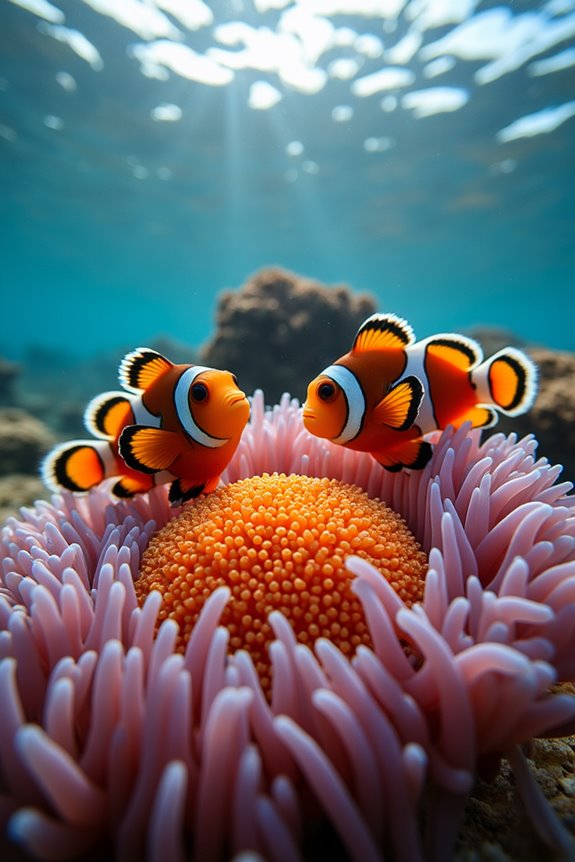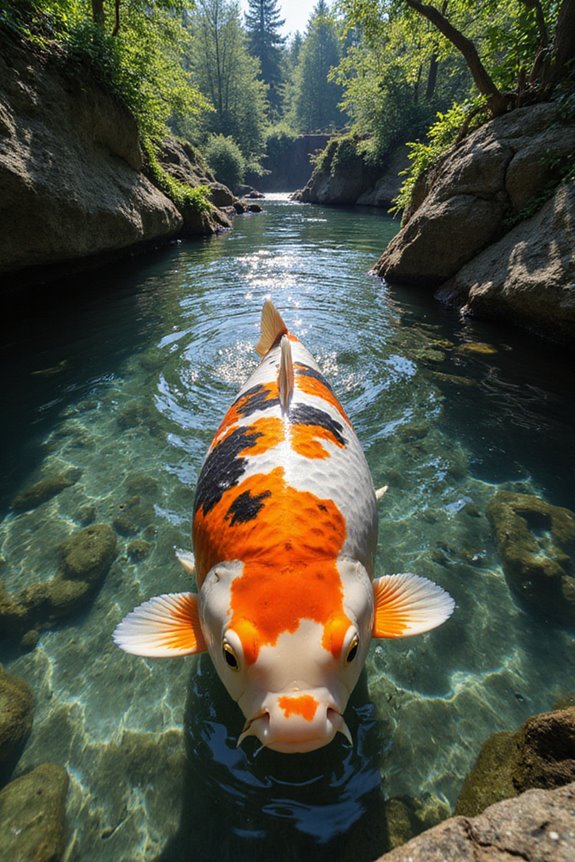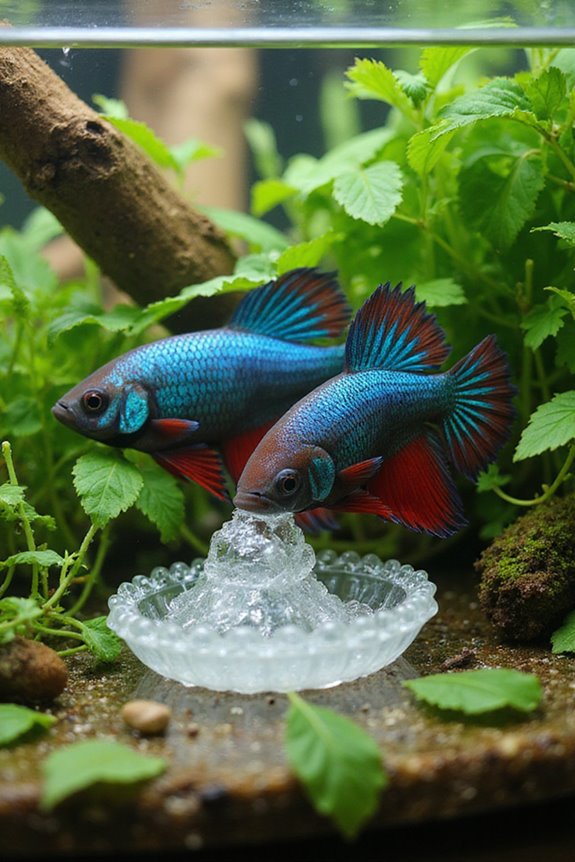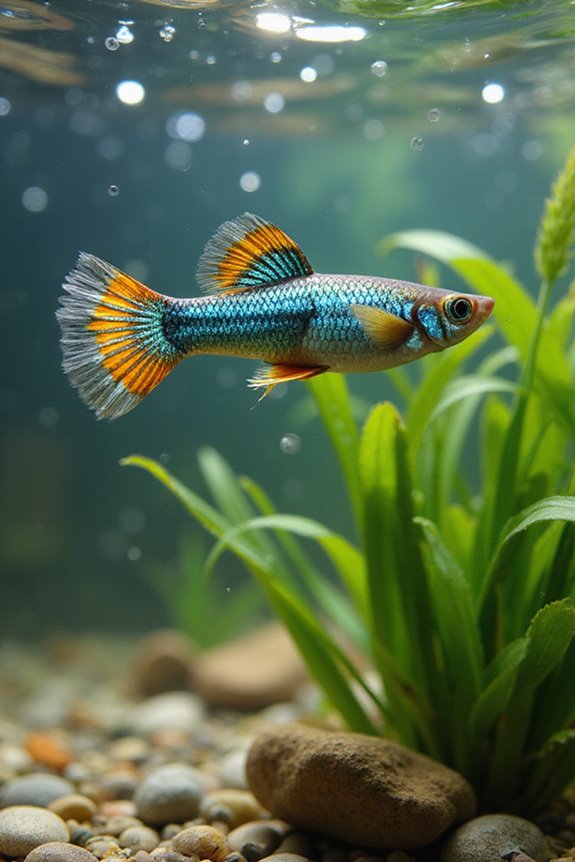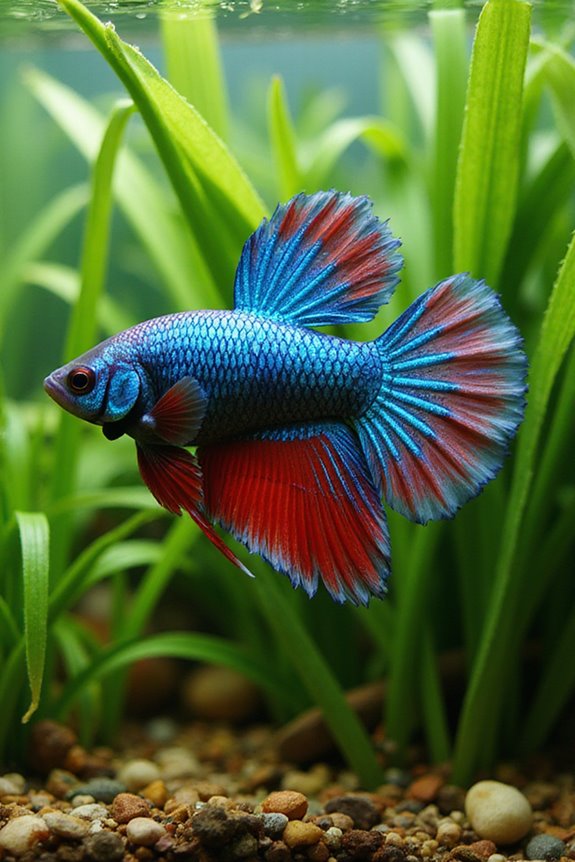Clownfish do, in fact, eat their own eggs due to a variety of factors. Stress from poor water quality or unsuitable breeding conditions can lead them to consume healthy eggs. They also selectively eat nonviable or damaged eggs to maintain nest cleanliness. Factors like water temperature, specific gravity, and tank cleanliness greatly influence this behavior. Maintaining ideal conditions greatly reduces unnecessary egg consumption, and monitoring their actions can help you understand their breeding habits better. More insights await.
Key Takeaways
- Clownfish may eat their own eggs due to stress or poor water quality, affecting breeding success.
- Male clownfish typically cull nonviable or damaged eggs to maintain nest health and enhance offspring survival.
- Filial cannibalism allows clownfish to recover energy and focus resources on healthier offspring, increasing reproductive rates.
- New breeding pairs often consume more eggs initially, but become more selective over time as they gain experience.
- Optimal aquarium conditions, including water quality and temperature, can significantly reduce unnecessary egg-eating behavior.
Clownfish Reproductive Behavior
Clownfish reproductive behavior is fascinating, especially when you consider their unique social structure within sea anemones. In clownfish mating, a dominant female lays between 100 to 1,000 eggs, which the male then fertilizes externally. The male takes on major parental roles, providing about 90% of the care, such as guarding and fanning the eggs to guarantee they receive enough oxygen. The female primarily defends the nest territory, allowing the male to focus on the developing eggs. This division of labor optimizes the survival of their offspring in predator-rich environments. When a breeding individual dies, the male undergoes a sex change, guaranteeing continuity in this intricate social structure, which further underscores the clownfish’s remarkable reproductive adaptability. Just like successful fishing depends on barometric pressure trends, clownfish breeding success is heavily influenced by environmental conditions including water temperature and quality.
Reasons for Egg Consumption
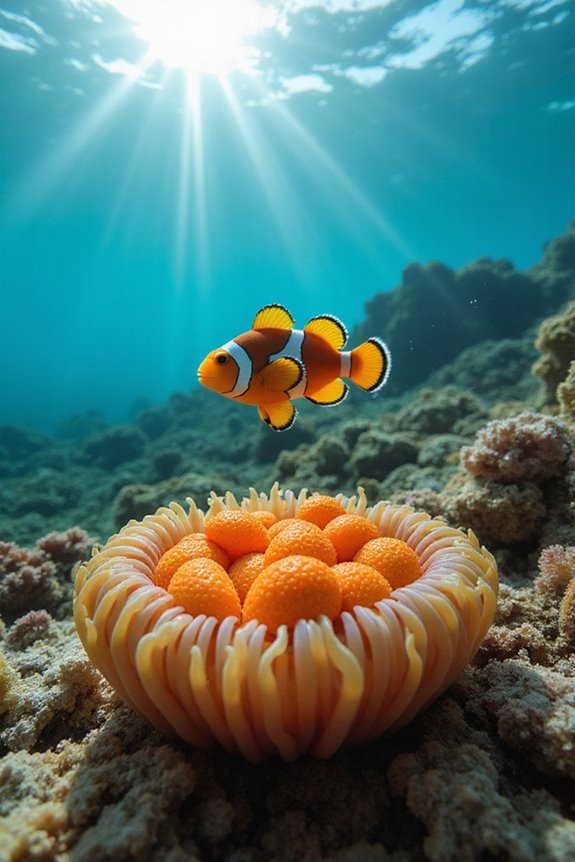
Egg consumption among clownfish is a behavior driven by several factors that can considerably impact their breeding success. Stress triggers like poor water quality or inadequate hiding spots can lead clownfish to eat their eggs, often without realizing they’re consuming healthy ones. When stressed, the focus on parental instincts diminishes, increasing egg consumption incidents. Clownfish also eat unfertilized or nonviable eggs to keep the nest clean, preventing waste buildup that could harm viable ones. Additionally, they consume infected or damaged eggs to limit disease spread, fostering a healthier environment for the remaining clutch. Proper weight selection when using Carolina rig weights can minimize disturbances near breeding areas, reducing stress that might trigger egg-eating behaviors. Understanding these reasons helps in creating ideal tank conditions, which can reduce unnecessary egg-eating behavior and enhance breeding outcomes.
Selective Egg-Eating Patterns
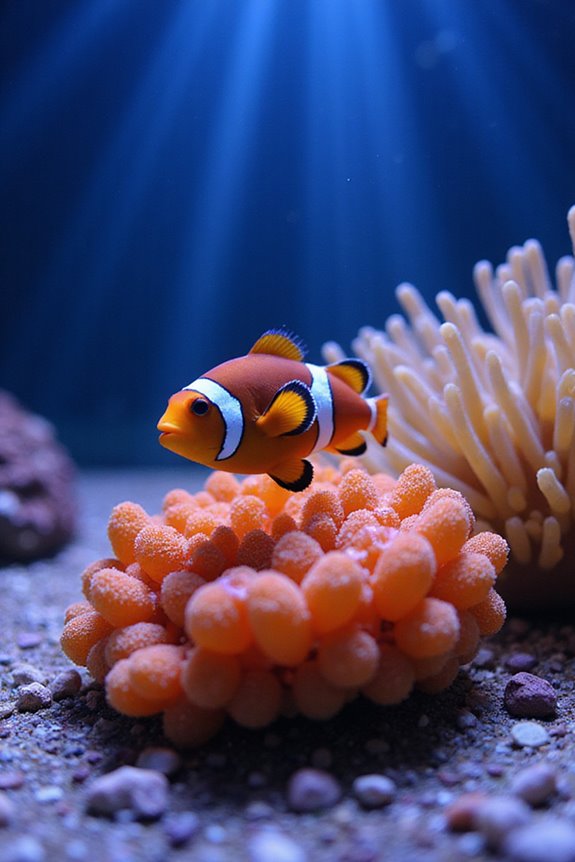
When evaluating selective egg-eating patterns in clownfish, it is essential to understand how these behaviors can influence breeding success. Male clownfish tend to cull nonviable or damaged eggs during their diligent care. They focus on eggs showing fading coloration or developmental abnormalities, leaving healthy ones intact. This selective pressure helps maintain egg viability, ensuring that resources are allocated to thriving offspring. Notably, newer breeding pairs might consume more eggs initially but become more discerning over time. Environmental factors, such as diet and water conditions, can also impact their egg-eating tendencies. By consistently inspecting and removing weak eggs, clownfish optimize clutch health, ultimately increasing hatching rates and improving fry survival. Just like some environmentally conscious anglers choose biodegradable fishing lines to protect aquatic habitats, clownfish naturally contribute to their ecosystem through their selective egg management.
Benefits of Filial Cannibalism
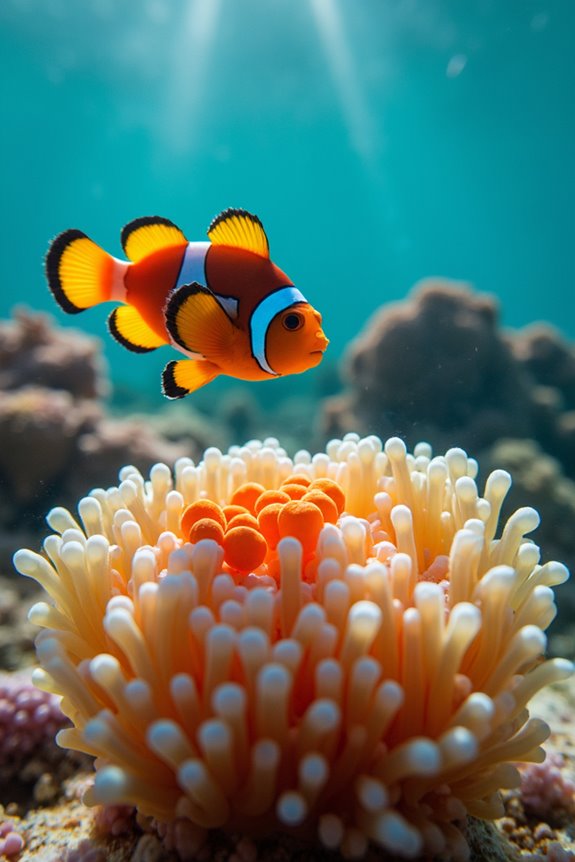
In the world of clownfish breeding, filial cannibalism offers several advantages that can enhance overall reproductive success. Consuming their own eggs allows parents to recover essential parental energy, especially during times of food scarcity. This strategy also supports brood management by eliminating sick or weak offspring, ensuring that resources are concentrated on healthier individuals. By doing so, parents can increase the survival rates of those remaining. Additionally, this behavior enables clownfish to optimize parental investment, allowing them to restart reproduction sooner and reduce time spent on less viable eggs. This results in more frequent breeding cycles, ultimately boosting their reproductive rates and ensuring a stronger, more resilient brood in a challenging environment.
Impact of Aquarium Conditions
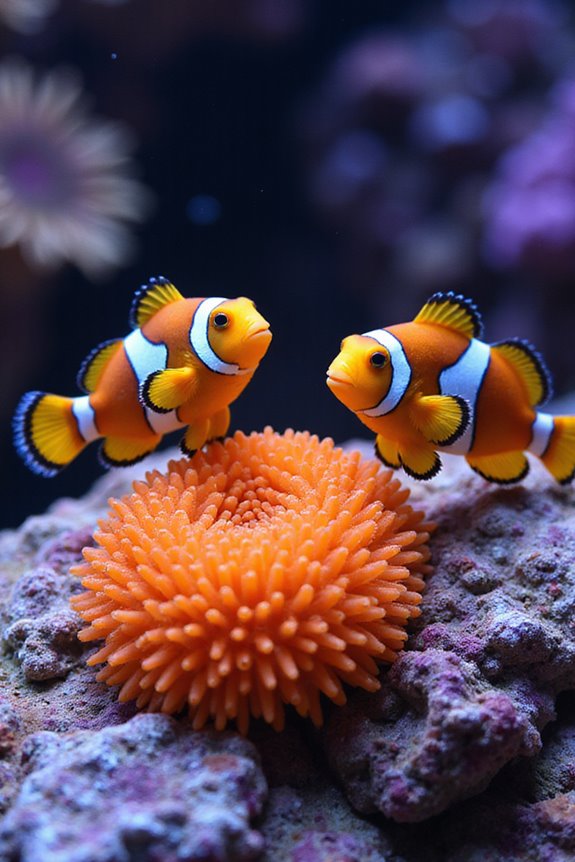
Aquarium conditions greatly influence clownfish breeding success, just as filial cannibalism impacts their reproductive strategy. Effective aquarium management is fundamental for peak breeding. I maintain specific gravity between 1.020 and 1.022, and I keep the water temperature elevated to around 83-84°F for spawning. It’s essential to guarantee pristine water quality, with low nitrates and no ammonia or nitrite. I use breeding tiles in a clean environment, avoiding anemones to simplify egg collection. Heavy feedings of high-quality food condition pairs, enhancing their readiness. I also monitor behavioral cues, like the dominant female’s increased cleaning activity, which indicates she’s ready to lay eggs. This careful approach is critical for maximizing breeding success and guaranteeing healthy fry development.
Conservation and Breeding Insights
Understanding the conservation and breeding of clownfish is vital, especially as their populations face challenges from over-collection and habitat degradation. While clownfish are listed as Least Concern on the IUCN Red List, their populations in exploited areas suffer. To guarantee population stability, we need effective breeding programs that focus on sustainable practices. Setting up a breeding tank with clean, flat surfaces and good water quality is essential. Males provide critical care to eggs, so maintaining stable environmental conditions—like appropriate lighting and temperature—is necessary for hatching success. Supporting captive breeding initiatives can reduce pressure on wild populations, thereby safeguarding clownfish for future generations. By actively participating in these programs, we can help preserve their habitats and secure their survival.
Frequently Asked Questions
Can Clownfish Eat Their Own Eggs Multiple Times?
Absolutely, clownfish can eat their own eggs multiple times. This reproductive behavior often reflects their parental care instincts, especially when stressed. They focus on maintaining the health of their nest, selectively consuming unhealthy eggs.
How Long Do Clownfish Eggs Take to Hatch?
“Patience is a virtue.” During the hatching process, clownfish eggs typically take 6 to 12 days for egg incubation. I’ve found that temperature and conditions greatly influence how quickly they develop and hatch.
Do All Clownfish Species Exhibit Egg-Eating Behavior?
I’ve noticed that not all clownfish species exhibit the same egg-eating behavior. Some are more cautious, while others consume nonviable eggs to protect their clutch, influenced by environmental factors and breeding experience.
What Colors Do Clownfish Eggs Typically Have?
When I observe clownfish breeding, I notice their eggs start vibrant orange, then shift to dull gray or silver as they develop. This color variation really highlights the health and viability of the eggs.
Can Clownfish Recognize Their Own Eggs?
I’ve read that clownfish might not have strong egg recognition abilities. Their parental instincts drive them to care for the clutch, focusing on maintaining healthy eggs rather than distinguishing individual ones. It’s quite fascinating!

